Craig Richov Receives WCLT President’s Award
Craig Richov, a long-time champion of land preservation, was recently named recipient of the 2009 President’s Award from
the Westborough Community Land Trust (WCLT). The award honored Craig’s work to benefit WCLT, as well as his three decades of
protecting farmland and promoting sustainable agriculture with the state’s Department of Agricultural Resources.
[MORE]
|
Westborough Purple Loosestrife Biocontrol Project
Until recently, it was easy to feel helpless in the face of the relentless onslaught of invasive species, but now something
practical can be done about at least one of them. That’s what Westborough Community Land Trust volunteers and Westborough High
School environmental science students are discovering as they work together to fight the purple loosestrife invasion in Westborough.
[MORE]
|
Meet the New Directors
WCLT members elected six new Directors at this year’s Annual Meeting in June.
[MORE]
|
Birds at Gilmore
What birds have you seen in Westborough? Check your sightings against the list below of 51 species of birds recorded at Gilmore
Pond and vicinity throughout the year by WCLT member Sharon Williams as part of her work toward a birder's certificate from Mass
Audubon.
[MORE]
|
Tree Hike
On a WCLT family hike in September, forester Bill Carr described the tales that trees can tell us about land use change,
weather conditions, and ecology in the forest at the Bowman West conservation area, as Kris Allen led the group to WCLT’s Hidden
Meadow and back. [MORE]
|
Charm Bracelet Approaches 10th Anniversary in 2010
Westborough’s Charm Bracelet trail is approaching its 10-year anniversary in 2010. The Charm Bracelet trail is a joint effort
of the Town’s Open Space Preservation Committee (OSPC) and the private, nonprofit Westborough Community Land Trust.
[MORE]
|
|
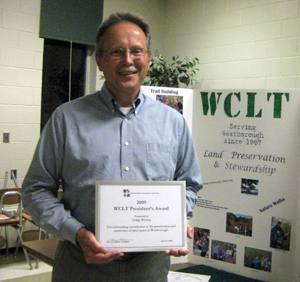
Craig Richov, a long-time champion of land preservation, was recently named recipient of the 2009 President’s Award from the
Westborough Community Land Trust (WCLT). The award honored Craig’s work to benefit WCLT, as well as his three decades of protecting
farmland and promoting sustainable agriculture with the state’s Department of Agricultural Resources.
The President’s Award recognizes a WCLT member who has given exemplary service to the organization. WCLT president Garry Kessler
presented the award at the Annual Meeting in June.
Garry noted that Craig is a founding member of WCLT who served on the Board of Directors during the land trust’s first eight years,
five of them on the Executive Committee. Craig’s contribution as chairman of the Land Acquisition Committee for WCLT’s first five years
proved invaluable when the land trust was developing its land protection policies.
To date, Craig has been instrumental in WCLT’s protecting 160+ acres of open space. The most recent land acquisition to his credit
is 14.4 acres near West Meadow Plaza, a gift from the Indian Pond Preservation Trust.
Craig’s knowledge of land protection, rapport with landowners, and diplomatic, patient negotiation skills set the standard for the
land trust. “As chair of Acquisitions for its first five years, I was able to help WCLT put down procedures and policies and to get
organized,” says Craig.
Early in life, Craig developed a love for plants and admired those who grew them, and this admiration led him to pursue agricultural policy as a career. Maybe it was the arugula grown by his grandfather and father from seed collected from the old country, Croatia. Or the enveloping green warmth of the greenhouses Craig worked in as a young man on Long Island or in the country’s growing environmental movement. Whatever it was, Craig was hooked.
“Throughout my school years, my interest was always in the sciences, particularly biology and botany,” says Craig. It seemed
natural to seek a degree combining agriculture and science at Cornell University’s prestigious College of Agriculture and Life
Sciences. It was there he became aware of the challenges surrounding food policy and the agricultural industry in the Northeast.
At Cornell Craig also met his future wife Kathy, who innately understood his attraction to horticulture. Her family has operated
the George Baldelli Greenhouses in Marlborough for the past 62 years. After graduation and their marriage, Craig gained experience
in purchasing, retailing and wholesaling fruits, vegetables and ornamental crops with A. Russo and Sons in Watertown. “I enjoyed
doing business with farmers and shared an enthusiasm with customers for locally grown foods,” Craig says.
Craig joined the Department of Agriculture in 1978, the same year he moved to Westborough. He put his expert understanding of farm markets to work as marketing specialist and then Chief of the Bureau of Markets. From 1983 to 1991 he joined the Agricultural Preservation Restriction Program as Senior Land Use Planner. During this time, Craig became skilled in negotiating with land owners to realize the goals of both the farmers and the state’s agricultural program. He worked with farmers to sell the development rights on their property to the state and a municipality, enabling farmers to realize some of the equity in their land without having to sell it for development.
“There are many benefits to keeping farms in active agricultural use,” says Craig. “The farms are kept under private ownership, yet the pubic still can enjoy beautiful views, open space and watershed protection—with the added benefit of local food production for the community.” During his tenure Craig was instrumental in permanently preserving more than 30,000 acres of farmland across Massachusetts.
As the current Director of the MA Farm Viability Enhancement, Craig helps farmers transition from traditional to modern
agriculture. This innovative program integrates technical assistance, business planning, access to capital and farmland preservation.
It provides farmers with a team of production and marketing specialists, farmer mentors, an accountant and a business plan writer.
“Our teams help farmers to modernize through the use of labor-saving technologies, updated equipment, value added processing and new market access strategies. These improvements can make the farm economically profitable and environmentally sustainable,” Craig says. “Each year, the program is able to assist about 24 farms by providing technical assistance, planning and grants. Annually we put about 2,000 acres under short-term protective covenants.”
Some of the produce from these farms finds its way to the Massachusetts Emergency Food Assistance Program, which Craig also
oversees. This program provides $12 million a year to the four major food banks in the state. “Our Food Assistance Program purchases
and distributes food to over 800 kitchens, pantries and shelters statewide,” notes Craig. “Some of the funding is used to buy fruits,
vegetables and eggs from local farms, so our neediest citizens can have fresh, nutritious products while providing a new market for
Massachusetts farmers.”
When the idea to protect land in Westborough by establishing a private land trust surfaced in 1996, Craig immediately offered his
expertise to WCLT.
“We all can make decisions everyday that will affect our sustainability on this planet,” notes Craig, “and being concerned about our environment is a smart thing for individuals and businesses. Caring for our environment is in our laws, religious teachings, and culture. Even the Constitution of the Commonwealth of Massachusetts says, ‘The people shall have the right to clean air and water… and the natural scenic, historic, and aesthetic qualities of their environment.’”
Craig Richov has been working for more than three decades to preserve that right.
Back to top
|
|
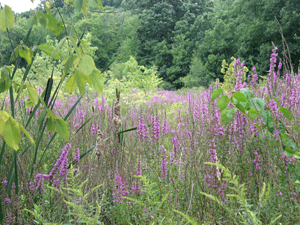
Fish and Wildlife cattail swamp being taken over by purple loosestrife
Until recently, it was easy to feel helpless in the face of the relentless onslaught of invasive species, but now something
practical can be done about at least one of them. That’s what Westborough Community Land Trust volunteers and Westborough High
School environmental science students are discovering as they work together to fight the purple loosestrife invasion in Westborough.
The Westborough purple loosestrife biocontrol project involves raising Galerucella beetles, which eat purple loosestrife leaves
in both their caterpillar and adult stages, and releasing them into loosestrife-infested areas. The project will run through 2012
in order to establish resident populations of beetles that will keep the plant in check.
“We hope to have a local impact on this regional problem. It only takes a few committed volunteers to make a big difference,”
said WCLT president Garry Kessler.
Westborough joins more than 40 communities and areas in Massachusetts, including Grafton and Uxbridge, where the Galerucella
beetles have been released. The beetles have been used in Massachusetts for over 15 years and in all the New England states. The
U.S. Department of Agriculture (USDA) and U.S. Department of Fish and Wildlife have approved their use.
By involving WHS students, the Westborough purple loosestrife biocontrol project brings educational as well as environmental
benefits. The project is inexpensive and low-tech. It is funded by WCLT using a portion of a Staples education grant.
“Students need a way to connect what they learn to the real world. Through this project my students learned about ecology,
invasive species, and what can happen when an ecosystem is disturbed,” said Westborough High School teacher Anita Lotti.
The project got underway in early April when the 25 students in Anita Lotti’s environmental science class put on waterproof
boots and braved occasional snow flurries to dig up a dozen dormant purple loosestrife plants from the shores of Mill Pond. The
class potted the plants and set them up in the WHS greenhouse, using a plastic wading pool half-filled with water to simulate a
wetland.
In May, the WHS environmental club released “starter beetles” onto the plants to begin their reproductive cycle.
“I know the students enjoyed taking care of the beetles,” Anita reported. “They fought over whose turn it was to head to the
greenhouse to do observations.”
When the high school closed for the summer, WCLT volunteers moved the plants, wading pool, and beetles to the backyard of WCLT
members Janet and Warren Anderson, who cared for them with their daughter Liz. “I like it when the beetles’ caterpillars are still
too small to see but you can see that the leaves are being eaten so you know they are there!” said Liz, who attends WHS.
When the new generation of beetles was ready in July and August, WCLT volunteers released them at loosestrife-infested sites at
Mill Pond and Mass Fish and Wildlife’s Westboro Management Area.
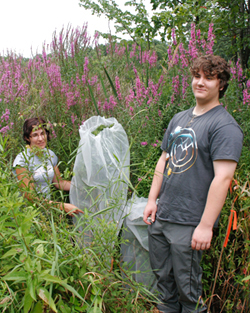
Debbie Okita and her son Craig releasing beetles at the Fish and Wildlife cattail swamp.
“Releasing the beetles and the caterpillars has been fun,” said volunteer Debbie Okita, “but after the long wet summer, it’s a
relief to see them finally released to begin their work of controlling the loosestrife.”
In the fall and spring, WHS environmental science classes and WCLT volunteers plan to monitor the release sites using procedures
recommended by the state.
WCLT obtained permission or licenses for the project from the Mass Department of Conservation and Recreation (DCR), Mass Fish and
Wildlife, and the Westborough Conservation Commission.
Advice and guidance was provided by the Mass Wetlands Restoration Project (WRP), the Neponset River Watershed Association (NepRWA),
the Nashua River Watershed Association (NRWA), and a teacher at Curtis Middle School in Sudbury.
“Fighting invasives is a very important, although perhaps less glamorous, part of conservation efforts,” said WCLT volunteer
Vivian Kimball. “I'm proud to be doing my part with this project, and I hope others will be inspired to join the fight and to learn
about the plants in their own backyards.”
For more information and helpful links, go to:
http://www.westboroughlandtrust.org/invasive/purple.php
http://www.westboroughlandtrust.org/nn/nn126.php
Back to top
|
|
WCLT members elected six new Directors at this year’s Annual Meeting in June.
All six have joined the Public Outreach Committee for 2009-2010, with Sue Abladian and Rickey Lopatin serving as co-chairs.
Sue Abladian
Sue has been a Westborough resident for over 30 years, raising her family here. She has been active in school parent groups,
serving as president for two years, and has been a Scout Leader. She has worked with many volunteer organizations, including
United Way, the Rotary Club, and the Garden Club. Her community service includes a term on Westborough's Board of Selectmen
and work with the Good Government Committee. She has professional background in marketing.
Elaine Birkholz
I've had a lifelong interest in preserving the beauty of nature for all to enjoy, fostered by my early experiences in Girl
Scouting. I've visited many of this country's national parks and would love to visit more of them when I retire. I've been a
longtime supporter of the Sierra Club and, more recently, the National Parks Conservation Association.
I've been a member of WCLT since 1998, almost as long as I've lived in Westborough. During these eleven years, I've participated
in many different nature walks, hiked many of its Charm Bracelet trails, coordinated several Earth Day cleanups, and supported our
son John's Eagle Scout trail improvement project along the shores of Mill Pond.
Vivian Kimball
Before moving to Westborough in June 2008, Vivian Kimball spent four years designing children's books in New York City. While she
still works on design projects in a freelance capacity, she recently began studying Conservation Biology at Antioch University New
England. In addition to volunteering with WCLT's Education Committee, she is also a member of the Assabet Valley Mastersingers.
Vivian loves the 5-minute walk to the South Street Diner and Bay State Commons, and is enjoying her new home with her husband,
Jeff, and two cats.
Pat Lambert
A Westborough resident for 13 years, Pat is an active member of the Appalachian Mountain Club's Worcester Chapter. In addition to
being a hike and bike leader, she is currently the Chapter's Hiking Chair. Pat also served on the inaugural board of the Westborough
Youth Basketball Association (2007-2008) and helped to establish the organization's bylaws. She lives on Pinecrest Drive with her
two children, Stephen and Carolyn Monette.
Rickey Lopatin
As a native Bay Stater from the western part of Massachusetts, I have lived in Westborough since 1975. I was employed professionally
as Speech Language Pathologist until retiring in 2000 and am currently employed in marketing/exhibiting and travel around the country
doing market research. I hold a bachelor's degree from Boston University and a master's degree from Worcester State College. I have
volunteered in town with Girl Scouts, my faith community, and human services. I was a volunteer docent at Garden in the Woods. I am
a strong supporter of the Public Library, as I love to read. I also enjoy gardening, especially native plants and wildflowers.
Sharon Williams
Sharon grew up in the Pacific Northwest where an appreciation of open spaces was easily acquired and taken for granted. She carried
this appreciation into adult life and fostered it in others as a Scout Leader. Sharon is a member of the WCLT Stewardship Committee
and works to preserve our open spaces and bring an awareness of them to others. A recent project of Sharon's is surveying the birds
at Gilmore Pond over the year.
Back to top
|
|
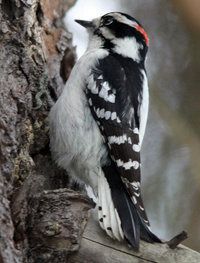
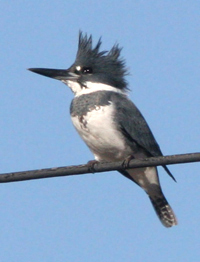
(left) Downy Woodpecker male, (right) Belted Kingfisher male
What birds have you seen in Westborough? Check your sightings against the list below of 51 species of birds recorded at Gilmore
Pond and vicinity throughout the year by WCLT member Sharon Williams as part of her work toward a birder's certificate from Mass
Audubon.
Sharon notes that her most exciting sighting at Gilmore Pond was a pair of scarlet tanagers — because a pair means probable
nesting.
She has also seen a wood duck with three ducklings on the pond. The water attracts other birds such as the green heron, belted
kingfisher, and great blue heron.
Warblers also frequent the area at certain times of year, including the blue-winged warbler, common yellowthroat, northern parula,
yellow warbler, and yellow-rumped warbler.
Sharon was surprised that she didn’t observe greater numbers of our common birds, such as black-capped chickadees and northern
cardinals, although she reports observing hundreds of robins at Gilmore Pond last spring.
Sharon invites WCLT members and friends to respond to her with reports of birds seen at Gilmore and vicinity, even if the birds
are already on her list. Just click here to send Sharon an email with the subject line "Birds
at Gilmore."
American Crow
American Goldfinch
American Redstart
American Robin
Baltimore Oriole
Belted Kingfisher
Black-capped Chickadee
Blue Jay
Blue-Winged Warbler
Blue-gray Gnatchatcher
Brown-headed Cowbird
Cedar Waxwing
Chipping Sparrow
Common Grackle
Common Yellowthroat
Dark-Eyed Junco
Downy Woodpecker
Eastern Bluebird
Eastern Kingbird
Eastern Phoebe
Eastern Towhee
European Starling
Gray Catbird
Great Blue Heron
Great Horned Owl
Green Heron
Hairy Woodpecker
House Finch
House Sparrow
House Wren
Mourning Dove
Northern Cardinal
Northern Flicker
Northern Mockingbird
Northern Parula
Pine Siskins
Red Winged Blackbird
Red-Bellied Woodpecker
Red-Tailed Hawk
Rose-breasted Grosbeak
Ruby-Crowned Kinglet
Ruby-Throated Hummingbird
Savannah Sparrow
Song Sparrow
Tree Swallow
Tufted Titmouse
White-breasted Nuthatch
Wood Duck
Wood Thrush
Yellow Warbler
Yellow-rumped Warbler
Back to top
|
|
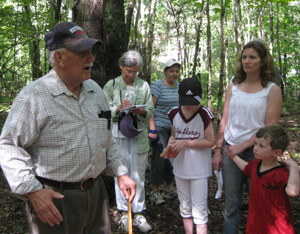
On a WCLT family hike in September, forester Bill Carr described the tales that trees can tell us about land use change,
weather conditions, and ecology in the forest at the Bowman West conservation area, as Kris Allen led the group to WCLT’s
Hidden Meadow and back.
To download and print out WCLT’s new trail map of the Bowman West area, go to the
WCLT home page and click on Bowman West in the New Trail Maps list.
Back to top
|
|
 Westborough’s Charm Bracelet trail is approaching its 10-year anniversary in 2010.
Westborough’s Charm Bracelet trail is approaching its 10-year anniversary in 2010.
The Charm Bracelet trail is a joint effort of the Town’s Open Space Preservation Committee (OSPC) and the private, nonprofit
Westborough Community Land Trust.
In late 1999, Don Burn presented the concept of a trail network to OSPC and then to WCLT. Multiple trail projects got underway
in 2000.
How did the Charm Bracelet get its name? WCLT member Harry Newell had the inspiration for the name. The main trail would make
a grand loop around Westborough, like a bracelet. It would link Westborough’s “charms,” which are its open space areas.
Today the town’s many charms include: several Town-owned properties, such as the Bowman Conservation Area, the Headwaters
Conservation Area, the Libbey conservation area, and the recently acquired Lee property; some State-owned properties, including
Mass Fish & Wildlife’s Westboro Management Area, state hospital lands, and the shoreline of Mill Pond which is overseen by Mass
Department of Conservation and Recreation; and WCLT properties such as Gilmore Pond in the Upper Jackstraw Brook Reservation, the
Hidden Meadow at Bowman West, and the newly acquired Indian Pond property. The Charm Bracelet also connects to Sudbury Valley
Trustees’ (SVT) Sawink Farm and crosses briefly into Northborough where it links to SVT’s Cedar Hill Reservation. In addition, the
trail passes through the New England Forestry Foundation’s (NEFF) Wile Forest.
The main Charm Bracelet trail itself is now three-quarters finished, with 21 of its planned 28 miles completed, according to Don
Burn, champion of the Charm Bracelet project and long-time chair of WCLT’s Stewardship Committee. In addition, the trail network
currently contains 24 miles of side trails, with even more planned.
For several years now, the Charm Bracelet has made it possible to take long walks on the trails across both the south side and
the north side of Westborough. The south side walk covers 10 miles between Sandra Pond in the east and the commuter rail station in
the west. The north side route goes for 7.5 miles between Fish and Wildlife headquarters in the west and Sawink Farm in the east.
If you haven’t walked the Charm Bracelet or a side trail lately, fall is a beautiful time to do so!
Back to top
|
|
|